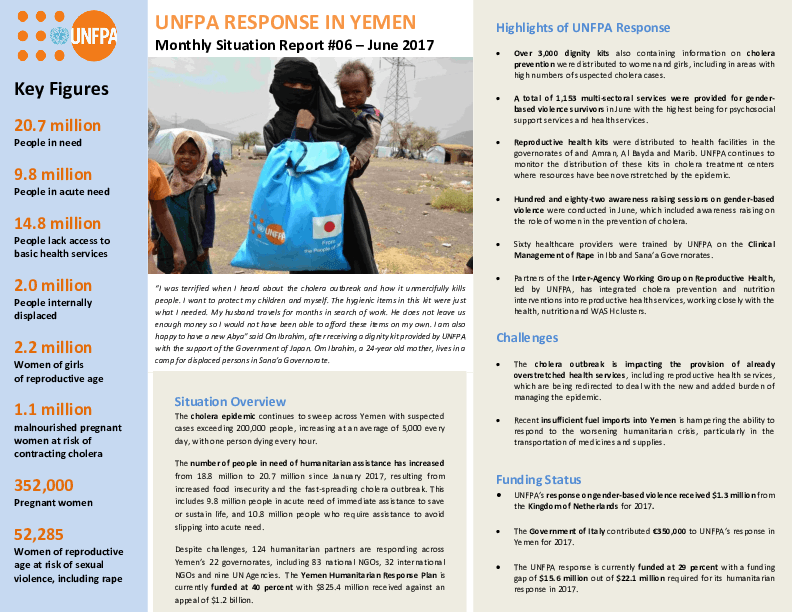
UNFPA Response in Yemen Monthly Situation Report #6 – June 2017
Resource date: 30 June 2017
Author: UNFPA Yemen
Situation Overview
The cholera epidemic continues to sweep across Yemen, with suspected cases exceeding 200,000 people, increasing at an average of 5,000 every day, with one person dying every hour.
The number of people in need of humanitarian assistance has increased from 18.8 million to 20.7 million since January 2017, resulting from increased food insecurity and the fast-spreading cholera outbreak. This includes 9.8 million people in acute need of assistance to save or sustain life, and 10.8 million people who require assistance to avoid slipping into acute need.
Despite the challenges, 124 humanitarian partners are responding across Yemen’s 22 governorates, including 83 national NGOs, 32 international NGOs and nine UN Agencies. The Yemen Humanitarian Response Plan is currently funded at 40 percent with $825.4 million received against an appeal of $1.2 billion.
Highlights of UNFPA Response
- Over 3,000 dignity kits, also containing information on cholera prevention, were distributed to women and girls, including in areas with high numbers of suspected cholera cases.
- A total of 1,153 multi-sectoral services were provided for gender-based violence survivors in June, with the highest being for psychosocial support services and health services.
- Reproductive health kits were distributed to health facilities in the governorates of and Amran, Al Bayda and Marib. UNFPA continues to monitor the distribution of these kits in cholera treatment centers where resources have been overstretched by the epidemic.
- One hundred and eighty-two awareness raising sessions on gender-based violence were conducted in June, which included awareness raising on the role of women in the prevention of cholera.
- Sixty health-care providers were trained by UNFPA on the Clinical Management of Rape in Ibb and Sana’a Governorates.
- Partners of the Inter-Agency Working Group on Reproductive Health, led by UNFPA, have integrated cholera prevention and nutrition interventions into reproductive health services, working closely with the health, nutrition and WASH clusters.
Challenges
- The cholera outbreak is impacting the provision of already overstretched health services, including reproductive health services, which are being redirected to deal with the new and added burden of managing the epidemic.
- Recent insufficient fuel imports into Yemen are hampering the ability to respond to the worsening humanitarian crisis, particularly in the transportation of medicines and supplies.
Funding Status
- UNFPA’s response on gender-based violence received $1.3 million from the Kingdom of Netherlands for 2017.
- The Government of Italy contributed €350,000 to UNFPA’s response in Yemen for 2017.
- The UNFPA response is currently funded at 29 percent, with a funding gap of $15.6 million out of $22.1 million required for its humanitarian response in 2017.